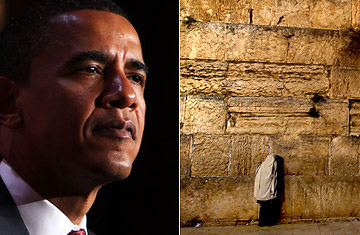
Senator Barack Obama will visit Israel.
If the rest of the world could vote in November's U.S. presidential elections, it's a safe bet that Senator Barack Obama would win in nearly every country — except Israel. Some of the very qualities that have generated unprecedented international buzz for a U.S. presidential candidate — his multicultural roots, his avowed willingness to talk with America's enemies — leave many Israelis skeptical of Obama. And despite Obama's staunch support of the Jewish state and the certification of him as politically "kosher" by its staunchest organized supporters in Washington, Israelis remain wary of his intentions.
Various smears linking Obama to Islamic radicalism have gained more traction in Israel than they have in the U.S. But even many of those who would dismiss such "Obama = Osama" slurs nonetheless view the Illinois Senator as wistfully naive about the deadly realities of the Middle East. Says Daniel Ayalon, who served as Israeli ambassador to Washington: "Obama's not really attuned to the region. Out here, dialogue is a sign of weakness. You can't reward [Iranian President Mahmoud] Ahmadinejad with dialogue." (Obama might be tempted to note that Ayalon's criticism comes at a moment in which Israel has been negotiating with Hamas, Hizballah and Syria.)
John McCain for now has much stronger support in Israel. A recent poll by the Tel Aviv–based Keevon Research, Strategy and Communication shows that McCain is favored by 43% of Israelis, compared with Obama's 20% (37% remain undecided). And the preferences are personal rather than partisan. The same poll found that if Senator Hillary Clinton were the Democratic candidate, Israelis would back her over McCain by 57% to 18%. But Keevon's director, Mitchell Barak, argues that Obama's standing is low among Israelis simply because he is an unknown quantity, especially compared with Clinton and McCain, who have both visited Israel frequently.
After clinching the G.O.P. nomination, McCain made Israel one of his first ports of call; in Jerusalem he donned a skullcap and prayed at the Western Wall, Judaism's holiest site. McCain's military background also appeals to Israelis' soft spot for fighting men. Four of the last five Israeli Prime Ministers earned their leadership stripes in the military. And Obama's openness to have a dialogue with those whom the Bush Administration have avoided engaging gives some Israelis pause. Says Barak, "For Obama to say that he's willing to talk to Hamas or the Iranians, who say they want us dead, means he doesn't understand where we're coming from." Although this may sound like a double standard — after all, Israel recently struck a truce with Hamas militants in Gaza — Israelis seem to expect swaggering idealism from American leaders and realpolitik from their own.
Some Israelis also are wary of the anti-Semitic views espoused in the past by African-American leaders like the Nation of Islam's Louis Farrakhan, and Obama's initial defense of the Rev. Jeremiah Wright turned many Israelis against him. Says Uri Avnery, a former leftist Knesset member and writer: "If it's a choice between a black American from a strange background and McCain, a white, pro-Israeli former military officer from a middle-class background, there's no doubt whom Israelis will prefer."
Obama will be doing his best to show Israelis why they have nothing to fear if he becomes the new tenant of the Oval Office next January. And a more recent poll shows that he may be making inroads on McCain's lead: a June survey by right-wing newspaper Makor Rishon showed that 36% of Israelis would prefer McCain as U.S. President, compared with 27% for Obama. But does anyone really care what Israelis think of U.S. presidential candidates? After all, they can't vote, and the extent of Israel's influence over how Jewish-Americans cast their votes is overrated, according to Barak, a veteran of several U.S. legislative campaigns. "American Jews vote on what's best for America, on the economy and social issues, not what's best for Israel," says the pollster. Indeed, most Jewish-American voters appear to have already decided how they will vote in November; one U.S. poll gives Obama more than 60% of the Jewish vote.
Still, the presumptive Democratic nominee is working hard to win over those who may question his commitment to Israel. At the annual congress of powerful pro-Israel lobby organization the American Israel Public Affairs Committee (AIPAC), Obama joined both McCain and Clinton as keynote speakers. And Obama's speech in support of Israel, which among other things urged the Jewish state to refrain from sharing Jerusalem with a Palestinian state (a position on which he was later forced to backtrack), drew warm applause.
Yet the speech had a mixed reception in Israel. "Tremendous. Impressive," exuded ex-ambassador Ayalon. "It levels the playing field between Obama and McCain." But others, like Yossi Beilin from the leftist Meretz Party, were dismayed by Obama's effusiveness. He argues that measuring U.S. politicians on the "friend of Israel" scale is "childish." Beilin says, "Bush was a friend of Israel, but no enemy of ours has caused us so much harm. He's responsible for Iran's spreading influence in the region." If Obama is elected President, says Beilin, he should know that "a true friend is one who saves us from our mistakes."
Although many in Israel would still prefer a McCain victory, Obama's visit is aimed at convincing Israelis that regardless of who wins in November, Israel will have a friend in the White House.
